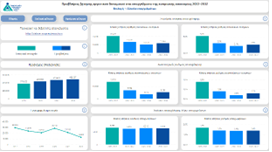Systematic monitoring of labour market trends and projection of future requirements, are key elements for a flexible labour market. The Human Resource Development Authority of Cyprus (HRDA), established systematic forecasting of labour demand. Its study ‘Forecasts of labour demand and supply in the Cyprus economy 2022-32’ includes for the first time labour supply forecasts among its other components. The study – completed in December 2022 – includes findings on total employment, employee education attainment, employment forecasts and trends.
Forecasts of labour demand and supply in the Cypriot economy for 2022-32 are indispensable for proper and timely planning and implementation of education and training activities. Labour demand forecasts were provided in economic sectors (three broad sectors, 21 main sectors and 52 sectors) and in 309 occupations (173 high-level occupations, 130 mid-level occupations and 6 low-level occupations). Labour supply forecasts were provided by gender and by education level.
Main findings
- Total employment in the period 2022-32 shows an upward trend. Employment is expected to increase by 52 577 persons or 12.1%.
- The vast majority of employed persons (8 out of 10) will continue to be in the tertiary sector, showing a significant increase. As a result, the dependence of the Cypriot economy on education services will also grow.
- An increase in employment is expected for all three broad occupational sectors (primary, secondary, tertiary). Almost half of the persons employed will continue to be in mid-level occupations (occupations that require secondary level education), while 4 out of 10 will be in high-level occupations (occupations that require tertiary level education).
- The total economically active population aged 15 to 64 shows an upward trend. In the timeframe 2022-32, it is forecast that the economically active population aged 15 to 64 will increase by 41 489 persons or 9.1%.
The results of the study were published on the HRDA website, with all available information on labour demand for 309 occupations presented in a user-friendly online tool. They will be used by policy-makers in education and training, and lifelong learning. They will also be used for the development of study programmes, including study programmes for secondary technical and vocational education (TVET) and for public schools of higher VET.
Source: CEDEFOP Cyprus: study results on labour demand and supply
More information: Forecasts of labour demand and supply in the Cyprus economy 2022 – 2032 – SUMMARY
Online tool (available in Greek only)





